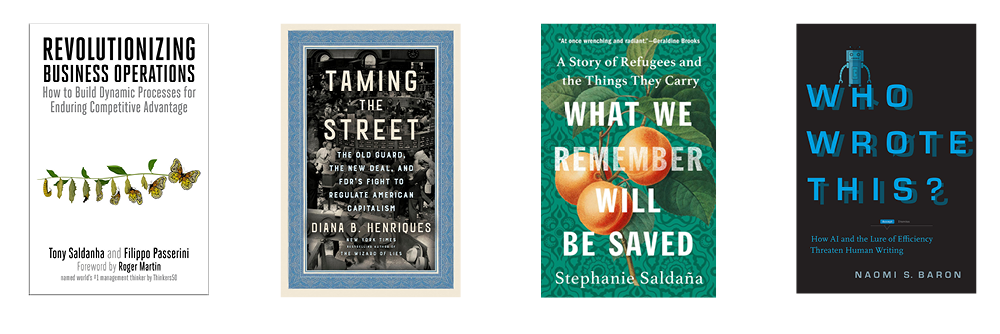September 12, 2023
September 12, 2023
Excellent new books are brought into the world every single week. Here at Porchlight, we track them all and elevate four new releases we are excited about as they hit bookstore shelves on Tuesday morning.
The books are chosen by Porchlight's Managing Director, Sally Haldorson, and the marketing team: Dylan Schleicher, Gabbi Cisneros, and Jasmine Gonzalez. (Book descriptions are provided by the publisher unless otherwise noted.) This week, our choices are:

Sally’s pick: Revolutionizing Business Operations: How to Build Dynamic Processes for Enduring Competitive Advantage by Tony Saldanha and Filippo Passerini, Berrett-Koehler Publishers
If you have a great product, but don’t have the operations in place to efficiently and effectively support it—production, manufacturing, sales, finance, human resources, etc.—you won’t succeed. Product innovation is seen as flashier and so gets far more attention, but you can create an enduring competitive advantage by revolutionizing business operations.
The problem is most attempts to improve business operations are reactive, sporadic, and siloed. Tony Saldanha and Filippo Passerini’s Dynamic Process Transformation model provides a living model for constant, ongoing process evolution and optimization.
The authors focus on maximizing three drivers of change. First, “open market rules”—each business process must be run as a separate business, instead of via monolithic mandates coming down from on high. Second, there must be “unified accountability”— outcomes must be clear and consistent across the company, instead of being siloed within departments. And third, there needs to be a “dynamic operating engine,” a methodology to convert the constantly changing business process goals into tactical day-to-day employee actions.
With numerous examples from leading companies, this book shows how to proactively keep business processes across the company from becoming obsolete and take advantage of a neglected key to success.
Dylan’s pick: Taming the Street: The Old Guard, the New Deal, and FDR's Fight to Regulate American Capitalism by Diana B. Henriques, Random House
Taming the Street tells the epic story of President Franklin D. Roosevelt's battle to regulate Wall Street in the wake of the 1929 Crash and the ensuing Great Depression. Deeply reported and vividly told, this tale takes readers back to a time when America’s financial landscape was a jungle ruled by the titans of vast wealth, largely unrestrained by government. Roosevelt ran for office in 1932 vowing to curb that ruthless capitalism and make the world of finance safer for ordinary savers and investors. His deeply personal campaign to tame the Street is one of the great untold dramas in American history.
The outcome of this fight was far from clear for FDR and his New Deal allies – who included the political dynasty-builder Joseph P. Kennedy and the future Supreme Court Justice William O. Douglas. Wall Street’s old guard, led by New York Stock Exchange president Richard Whitney, fought every new rule to the “last legal ditch.” That clash – between two sharply different visions of financial power and federal responsibility – has shaped how “other people’s money” is managed in America to this day.
As inequality once again reaches Jazz Age levels, Henriques brings to life a time when the system worked – an idealistic time when ordinary Americans knew what had to be done and summoned the will and the leadership to do it. A vital history and a riveting, true-life thriller, Taming the Street raises an urgent and troubling question: What does capitalism owe to the common good?
Gabbi’s pick: What We Remember Will Be Saved: A Story of Refugees and the Things They Carry by Stephanie Saldaña, Broadleaf Books
In an era of mass migration in which more than 100 million people are displaced comes this lyrical portrait of Syrian and Iraqi refugees and the belongings they carry. What We Remember Will Be Saved is a book of hope, home, and the stories we hold within us when everything else has been lost.
Journalist and scholar Stephanie Saldaña, who lived in Syria before the war, sets out on a journey across nine countries to meet refugees and learn what they salvaged from the ruins when they escaped. Now, in the narratives of six extraordinary women and men, from Mt. Sinjar to Aleppo to Lesvos to Amsterdam, we discover that the little things matter a great deal. Saldaña introduces us to a woman who saved her city in a dress, a musician who saved his stories in songs, and a couple who rebuilt their destroyed pharmacy even as the city around them fell apart. Together they provide a window into a religiously diverse corner of the Middle East on the edge of unraveling, and the people keeping it alive with their stories.
Born of years of friendship and reporting, What We Remember Will Be Saved is a breathtaking, elegiac odyssey into the heart of the largest refugee crisis in modern history. It reminds us that refugees are storytellers and speakers of vanishing languages, and of how much history can be distilled into a piece of fabric, or eggplant seeds. What we salvage tells our story. What we remember will be saved.
Jasmine’s pick: Who Wrote This?: How AI and the Lure of Efficiency Threaten Human Writing by Naomi S. Baron, Stanford University Press
Would you read this book if a computer wrote it? Would you even know? And why would it matter
Today's eerily impressive artificial intelligence writing tools present us with a crucial challenge: As writers, do we unthinkingly adopt AI's time-saving advantages or do we stop to weigh what we gain and lose when heeding its siren call? To understand how AI is redefining what it means to write and think, linguist and educator Naomi S. Baron leads us on a journey connecting the dots between human literacy and today's technology. From nineteenth-century lessons in composition, to mathematician Alan Turing's work creating a machine for deciphering war-time messages, to contemporary engines like ChatGPT, Baron gives readers a spirited overview of the emergence of both literacy and AI, and a glimpse of their possible future. As the technology becomes increasingly sophisticated and fluent, it's tempting to take the easy way out and let AI do the work for us. Baron cautions that such efficiency isn't always in our interest. As AI plies us with suggestions or full-blown text, we risk losing not just our technical skills but the power of writing as a springboard for personal reflection and unique expression.
Funny, informed, and conversational, Who Wrote This? urges us as individuals and as communities to make conscious choices about the extent to which we collaborate with AI. The technology is here to stay. Baron shows us how to work with AI and how to spot where it risks diminishing the valuable cognitive and social benefits of being literate.
WHAT WE'VE BEEN READING AT HOME
 "When the Hibiscus Falls features short stories set mostly in Covid-era America and the Philippines, focusing on relationships within Filipino-American families, past and present. So far, it is somber, each story ending inconclusively, with the heaviness of connecting or reconnecting with one’s culture and family histories."
"When the Hibiscus Falls features short stories set mostly in Covid-era America and the Philippines, focusing on relationships within Filipino-American families, past and present. So far, it is somber, each story ending inconclusively, with the heaviness of connecting or reconnecting with one’s culture and family histories."
—Gabbi Cisneros, Creative Director






